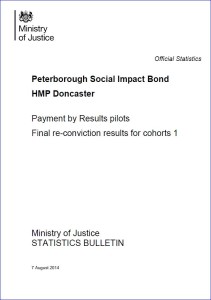Official results
On 7 August, the MoJ published the first official findings of the reducing reoffending pilots run at Peterborough and Doncaster prisons. The pilot has been high profile throughout its existence mainly because the Justice Secretary Chris Grayling referred to it constantly as an example of the changes he wanted to achieve through his radical overhaul/privatisation of the probation service via the Transforming Rehabilitation (TR) initiative.
There were different models and targets for each pilot site.
[divider]
Peterborough
The ONE Project at Peterborough sought to reduce the reoffending of short term prisoners released from Peterborough prison by providing them with a range of co-ordinated advice and support services including, in particular, support from trained mentors. The pilot was operated by Social Finance funded via a Social Impact Bond and operated by a partnership led by St Giles Trust.
The MoJ reports records reoffending for the 1st cohort of the pilot – adult male offenders released from HMP Peterborough between 9th September 2010 and 30th June 2012 having served sentences of less than 12 months. The re-offending measure used was the frequency of re-conviction events (The TR targets for new providers to be announced later this month are both binary – whether someone re-offends – and frequency – how often.)
between 9th September 2010 and 30th June 2012 having served sentences of less than 12 months. The re-offending measure used was the frequency of re-conviction events (The TR targets for new providers to be announced later this month are both binary – whether someone re-offends – and frequency – how often.)
There are two targets for reducing re-conviction events for the Peterborough pilot which, if achieved, would result in an outcome payment to the charities investing in the Social Impact Bond:
1. A reduction of 10% in the frequency of re-conviction events in each cohort of around 1,000 prisoners (this is calculated by comparison with a matched group – TR contracts will looked at how local reoffending rates change); and
2. If a 10% reduction in re-conviction events is not detected for either of the two PbR cohorts at the end of the entire pilot period, both cohorts will be evaluated together. If a reduction in conviction events of 7.5% or more is detected across all 2,000 offenders, investors will be paid an agreed fixed sum per reduced re-conviction event.
[divider]
Results
The frequency of re-conviction events for the first Peterborough cohort is 8.4% lower compared to a matched national control group (142 re-conviction events per 100 offenders compared to 155 re-conviction events per 100 nationally). This means that the provider failed to reach the 1st 10% target but is on track to achieve the second 7.5% target.
[divider]
Doncaster
The HMP Doncaster model is run by Serco (who hold the contract for operating the prison) in a partnership with Catch 22 and Turning Point which dissolved earlier this year.
The target for this pilot was a 5% reduction in the reconviction rate – a binary measure – Serco were required to achieve this target in order to retain the full operating value of their prison contract.
The re-conviction rate for the first offenders released from HMP Doncaster was 5.7 percentage points lower than the 2009 baseline year (from 58.0% in the 2009 baseline year to 52.2%), representing a successful outcome.
[divider]
Conclusion
So what do we make of these results? To me they represent a mixed picture, there’s no denying that reoffending has been reduced. However, we would normally expect a high level of performance from such a high profile pilot where the partners had chosen to participate and indeed championed and driven the initiative from the outset. On the other hand, there has been significant learning about how best to co-ordinate pre-and post-release activity, use mentors effectively and co-ordinate a multi-agency approach to preventing reoffending.
It’s not clear whether these results will be replicated once the new TR providers start operating in April 2015.








6 Responses
I wonder if any allowance has been made in the results based on police and court performance? Since it seems re-conviction is the measure, one way of hitting the target, but in a negative way, is if the police and courts become less effective at detecting and convicting criminality. Is any attempt made to account for this in the ‘success’ criteria?
Hi Adam
The short answer is no. Although going forwards, the TR PbR contracts will be based on year on year comparisons, so police and courts would have to get less effective every year…
Russell
You have been gone a while, by the way TR is still a terrible idea that will lead to all sorts of mess and fraud. Are you happy about CAPITA, A4E, SODEXO being in the mix?
Russell . Serco told the PAC yesterday that the recent deterioration at Doncaster (link below) was because they all took their eye of the ball of running the prison to concentrate on the PBR pilot
http://www.justiceinspectorates.gov.uk/hmiprisons/wp-content/uploads/sites/4/2014/08/Doncaster-Web-2014.pdf
Thanks very much Rob. That’s very interesting, if prime focus was on resettlement, it should have improved running of prison.
I understand Governors generally are focusing less and less on reducing reoffending, do you have any sense of this? Apparently, a KPI has changed…
The pilots are a red herring, of course they will produce results if you focus time,resources etc on them. The whole issue with under 12 months is that probation could have successfully worked with their group if there had been an investment in probation trusts to do this work with local providers. Now it is too late and it will be a disaster & those who have driven this must be held accountable for their actions. Probation staff have been bullied & used; hopefully enough have some fight left to salvage what we can of a once excellent service.